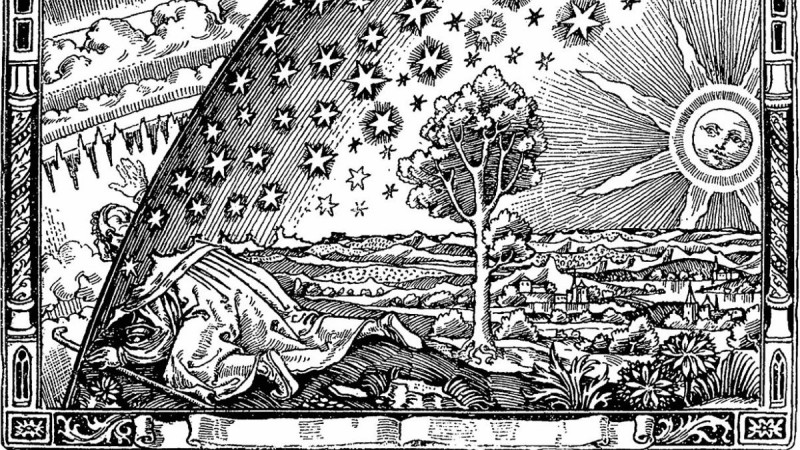 Correlation is not causation. How many times have we heard that sentence? Too many times maybe, because we seem to be mithridatized by it. Nowadays, it seems like it’s nothing more than an easy way to discard inconvenient facts. It is true that correlation is not causation, but what does that mean?
Correlation is not causation. How many times have we heard that sentence? Too many times maybe, because we seem to be mithridatized by it. Nowadays, it seems like it’s nothing more than an easy way to discard inconvenient facts. It is true that correlation is not causation, but what does that mean?
 In yesterday’s post, I explained how during my whole time as a physics student, I’ve never seen an example of a religious claim, positive or negative, creeping into the science teaching. It’s not that physical science is inconsequential to religious claims, it’s not. However, religion is off-topic in a science class, and there is only a conflict if someone brings religion into the classroom.
In yesterday’s post, I explained how during my whole time as a physics student, I’ve never seen an example of a religious claim, positive or negative, creeping into the science teaching. It’s not that physical science is inconsequential to religious claims, it’s not. However, religion is off-topic in a science class, and there is only a conflict if someone brings religion into the classroom.
 Here’s a great example of projection: many members of the religious right in the US are convinced that non-religious universities are indoctrination centers for the far left and atheism. Case in point, my fellow blogger Ambrose writes:
Here’s a great example of projection: many members of the religious right in the US are convinced that non-religious universities are indoctrination centers for the far left and atheism. Case in point, my fellow blogger Ambrose writes:
The reason that higher education in the sciences and philosophy purportedly reduces religious belief has as much to do with contemporary popular antitheistic indoctrination in those fields as any supposed increase in knowledge, much less baseline intelligence.
 Here’s a good case study of how scientific information gets distorted. This article has sources, which is a little unusual (but they are not links, probably to discourage you from checking them out for yourself), but look at how they're used...
Here’s a good case study of how scientific information gets distorted. This article has sources, which is a little unusual (but they are not links, probably to discourage you from checking them out for yourself), but look at how they're used...
 In my ongoing series of posts addressing the arguments from Michael, a militant Catholic, today’s post will examine the claim that the Bible’s cosmogony is unique among creation myths in that it talks about creation ex-nihilo. In Michael’s words:
In my ongoing series of posts addressing the arguments from Michael, a militant Catholic, today’s post will examine the claim that the Bible’s cosmogony is unique among creation myths in that it talks about creation ex-nihilo. In Michael’s words:
Every culture known believed that the Earth, stars, indeed the entire universe has been present in all eternity. Creation stories abounded, but all the stories began with matter that preexisted
.jpg) It’s quite amazing how often the Kalām Cosmological Argument, or some version of it, is still used by believers to justify their faith. It seems like a naive understanding of modern cosmology, coupled with confirmation bias, conspire to keep this tired argument on life support. In this series of posts, my intention is to explain some of the ways in which KCA is a terrible argument, one problem at a time. In this first post, I’ll focus on whether it’s reasonable to apply inductive reasoning to the universe.
It’s quite amazing how often the Kalām Cosmological Argument, or some version of it, is still used by believers to justify their faith. It seems like a naive understanding of modern cosmology, coupled with confirmation bias, conspire to keep this tired argument on life support. In this series of posts, my intention is to explain some of the ways in which KCA is a terrible argument, one problem at a time. In this first post, I’ll focus on whether it’s reasonable to apply inductive reasoning to the universe.
 Sometimes we ask the wrong questions, and answer them with bad answers. One particularly bad question is: “what was there before the Big-Bang?” There are many others, but this one requires a little mental gymnastics in order to get used to modern ideas of time and understand what the consequences are.
Sometimes we ask the wrong questions, and answer them with bad answers. One particularly bad question is: “what was there before the Big-Bang?” There are many others, but this one requires a little mental gymnastics in order to get used to modern ideas of time and understand what the consequences are.
 I’ve been watching this video of Rachel Maddow interviewing Rand Paul about civil rights. Paul’s argument is that private businesses should be left free to discriminate, because Liberty. I think he’s profoundly wrong, here’s why.
I’ve been watching this video of Rachel Maddow interviewing Rand Paul about civil rights. Paul’s argument is that private businesses should be left free to discriminate, because Liberty. I think he’s profoundly wrong, here’s why.
 The Christian blogs these days seem to be erupting with outrage over a short cartoon sequence in the new Cosmos TV show. The segment in question tells the story of Giordano Bruno, and it’s… well, cartoony, both literally and figuratively. That’s not shocking on its own, the science itself in Cosmos is cartoony: biologists will cringe at inaccurate representations of a DNA molecule, astronomers will face palm when Tyson’s spaceship avoids planetoids that are in reality many orders of magnitude farther away from one another. It’s the nature of the exercise: trying to convey complex ideas to an uninitiated public in simple and entertaining images, will require simplifications, dramatization, shortcuts, and even that you’ll occasionally be plain wrong. Being a science show, maybe it was sloppier and more caricature on the history. I don’t know, I’m no historian. As long as deception is not deliberate and central to the discourse…
The Christian blogs these days seem to be erupting with outrage over a short cartoon sequence in the new Cosmos TV show. The segment in question tells the story of Giordano Bruno, and it’s… well, cartoony, both literally and figuratively. That’s not shocking on its own, the science itself in Cosmos is cartoony: biologists will cringe at inaccurate representations of a DNA molecule, astronomers will face palm when Tyson’s spaceship avoids planetoids that are in reality many orders of magnitude farther away from one another. It’s the nature of the exercise: trying to convey complex ideas to an uninitiated public in simple and entertaining images, will require simplifications, dramatization, shortcuts, and even that you’ll occasionally be plain wrong. Being a science show, maybe it was sloppier and more caricature on the history. I don’t know, I’m no historian. As long as deception is not deliberate and central to the discourse…